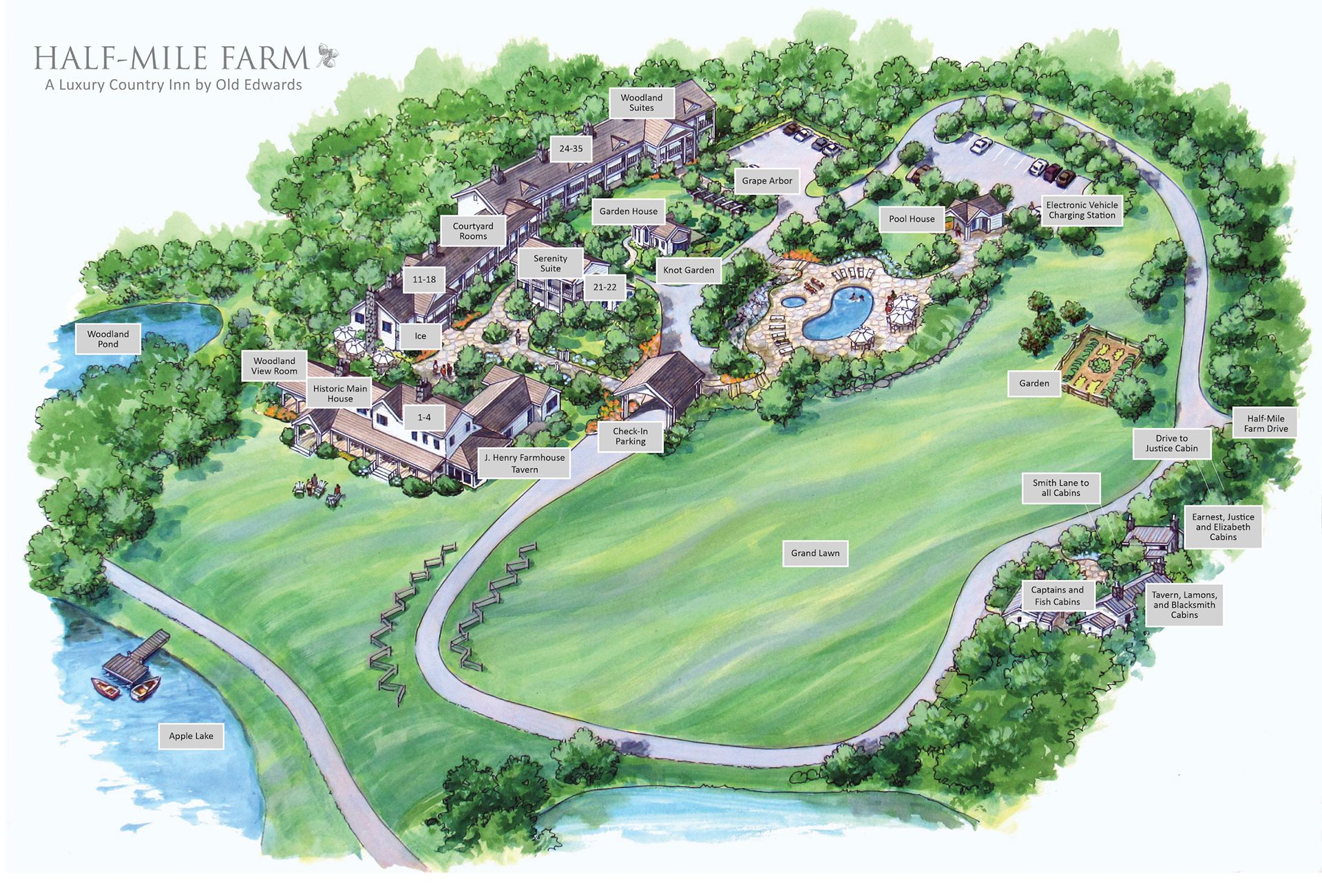Half Mile Farm: Discover Its Charm & Beauty!
So, what exactly is "half mile farm", and why does the term resonate with a certain segment of the population? More than just a name, "half mile farm" conjures images of a place, a lifestyle, perhaps even a philosophy, a feeling that has attracted people. It is a phrase that speaks of specific location with unique identity and potential. This article explores what "half mile farm" could mean, delving into its potential connotations and possibilities. The term has a certain ring to it, inviting curiosity about its specific nature, its location, and what it might represent. The allure of "half mile farm" is in its simplicity. It suggests a place of manageable size, a space both intimate and potentially self-sufficient. It speaks of an existence outside the hustle and bustle of the city, a space where life moves at a different pace. Whether its an actual farm or a conceptual space, the phrase holds a certain charm. The implications depend heavily on the context. Could it be a real place, a destination, or something else entirely? The possibilities are endless.
The term "half mile farm" inherently suggests a location. To understand its full potential, one must consider the tangible aspects of a physical space. A "half mile farm" could be a real geographical entity: a working farm, an estate, or a specific piece of land. In that case, the value of the name resides in its association with the area. The dimensions imply a degree of intimacy and control. A farmer can manage a half-mile radius more easily than a vast acreage. It can easily be visualized by customers and investors alike. In a business sense, "half mile farm" could be used as a brand name. Perhaps it is a purveyor of locally-sourced goods, a company offering farm-to-table dining experiences, or a purveyor of agricultural products. Branding would become key, defining the farm's mission, target audience, and core values. The emphasis would be on building a loyal customer base and telling a compelling story. The business would rely on the idea of local authenticity, and connection. The concept of "half mile farm" could also be interpreted as a lifestyle choice. For some people, it signifies a commitment to sustainable living, self-sufficiency, and a strong connection to nature. This might be the motivation for those living on or near the land, or a person interested in the farming lifestyle. For these individuals, "half mile farm" represents the values of mindful living and community involvement. It promotes a sense of belonging, offering the potential for a fulfilling life. The marketing potential of the term is undeniable. "Half mile farm" is a powerful starting point for marketing a product, service, or a concept. The name is already somewhat descriptive and suggestive. For instance, a farm operating under that name would be appealing to customers who value sustainability and locally sourced food. A real estate developer could create a residential community built around the principles of sustainable living. In each case, the emphasis would be on creating a brand that is both unique and memorable. To give "half mile farm" a distinct identity requires a strong understanding of its target audience. It's crucial to define the values and goals. Are the customers environmentally conscious? Are they seeking a sense of community? Or do they simply value high-quality products? The answers to these questions will influence marketing strategies, product offerings, and overall brand messaging. The success of the "half mile farm" concept will depend heavily on this. Consider the potential challenges associated with the "half mile farm" concept. The main difficulty lies in definition. To what exactly does the name refer? To what size of a physical space are we alluding? It's important to be clear about what the name represents. Competition is a significant factor as well. The farm may have to compete against other farms and businesses within the local region. Careful planning and effective execution would be crucial. The brand must convey a unique identity, and strong marketing will be essential. Exploring the related concepts associated with "half mile farm" is also important. These concepts can add depth and provide additional meaning. The phrase aligns with various related ideas, such as farm-to-table dining, sustainable agriculture, and community-supported agriculture (CSA) models. They all highlight the benefits of local products, environmental consciousness, and a strong connection to the land. These related concepts add context and help to clarify the vision. "Half mile farm" has strong geographical relevance. While the name does not refer to any specific geographic location, it suggests a rural setting. A farm of this size is most likely in a place with open land and a climate favorable for agriculture. The type of agriculture is very likely linked to the location. The area would be dependent upon the climate, the soil type, and other geographic factors. The farm's products will reflect the region. The potential products and services offered by a "half mile farm" can vary greatly. These may range from fresh produce and livestock to farm stays and educational workshops. Another option is to sell a wide variety of products, such as organic food, or locally crafted items. The key is to offer products and services that align with the farm's values and the demands of its customer base. The farm would have to adapt to seasonal changes and maintain quality. In summary, "half mile farm" is an appealing concept. It evokes a sense of place, a connection to the land, and a simpler way of life. It has positive connotations, especially for people interested in sustainability and local products. The success of the concept will depend on clear definition, effective branding, and strong execution. Ultimately, the "half mile farm" presents a unique opportunity to create a business, a lifestyle, or a brand that resonates with a growing audience. It's a concept that continues to gain popularity and holds a significant amount of potential for those who see its promise. The power of the phrase lies in its simplicity and evocative nature. It implies a sense of place, a connection to the earth, and a slower pace of living. Depending on the context, "half mile farm" can represent a physical location, a business, or a lifestyle. It is a concept that invites creativity, and it is full of potential. Whether a farm, a business, or a way of living, the allure of the "half mile farm" is its appeal. The "half mile farm" concept also presents opportunities for partnerships and collaborations. Forming partnerships with local businesses or organizations can strengthen the farm's position in the market. Collaborations can involve local restaurants that are interested in sourcing produce, or tourism agencies that want to promote agritourism. Another approach would be to work with other farms to share resources, reduce costs, and increase market reach. Collaborative efforts can offer many benefits to a "half mile farm". Sustainability is a core element of the "half mile farm" concept. Implementing environmentally friendly practices will be essential. The farm can make use of sustainable farming practices such as crop rotation, composting, and water conservation. The farm can invest in renewable energy, such as solar panels, to reduce its carbon footprint. A strong focus on sustainability can increase the value of the brand. When developing a business or brand around "half mile farm", its crucial to consider the competitive landscape. This requires researching the existing businesses and brands in the local area. This includes understanding their strengths and weaknesses, and the market share they hold. Identifying ways to differentiate the "half mile farm" from its competitors is a critical step. This includes creating unique products or services, strong branding, and a powerful marketing strategy. Effective marketing is important for the success of the "half mile farm" concept. Social media, a website, and other online channels can be used to reach the target audience. Content marketing, with blog posts or videos, can establish the brand as a leader. Public relations and media outreach can help to raise awareness. Building a loyal following will require a carefully crafted marketing strategy. Building a strong brand identity will be important. The brand identity should reflect the values and goals of the "half mile farm." The brand should be consistent across all channels, including the website, social media, and marketing materials. The brand should also communicate clearly with its target audience. The brand must be carefully developed. The concept of a "half mile farm" also opens opportunities for educational initiatives. The farm can host workshops, tours, or other events. This can create additional revenue streams, and it also gives customers a deeper connection to the farm. Educational efforts should include sustainability, organic farming, and other relevant topics. Educational initiatives can also support the community. Another aspect to consider is the long-term vision for "half mile farm." This involves assessing the current state of the farm, and also creating a plan for its future growth. The vision should include specific goals, milestones, and a plan for achieving those goals. Adapting to change and evolving along with the market will be important. Developing a long-term vision is critical. Financial planning is a critical part of any business. The farm should carefully manage its finances. This includes budgeting, forecasting, and tracking expenses. This includes developing a business plan, as well as securing funding from investors or lenders. A solid financial plan is essential for long-term sustainability. Finally, creating a sense of community is another important aspect. The farm can host events, support local causes, and partner with other community organizations. Building a strong community will build the farms reputation. Community involvement is very beneficial. In essence, "half mile farm" is a concept with enormous potential. With a clear vision, strong branding, and effective execution, it can be transformed into a successful business, a lifestyle choice, or a powerful brand. "Half mile farm" holds the promise of a unique experience. This is a concept that will likely continue to grow in popularity.



| Feature | Details |
|---|---|
| Keyword Term | Half Mile Farm |
| Possible Interpretation | A geographical location, a business, a lifestyle concept, a brand name |
| Potential Associations | Agriculture, rural living, sustainability, community, local products, a sense of place |
| Target Audience | Consumers interested in locally sourced products, those seeking a connection to nature, people looking for a slower pace of life, potential investors. |
| Marketing Opportunities | Branding a farm or business, creating a lifestyle brand, developing real estate, tourism. |
| Challenges | Defining the specifics of "half mile farm," competition from similar businesses or locations, accurately representing the brand. |
| Related Concepts | Farm-to-table, sustainable agriculture, agritourism, community supported agriculture (CSA), eco-friendly living |
| Geographical Relevance | The term doesn't specify a geographical location, but it is more likely associated with rural settings rather than highly urban ones. |
| Possible Products or Services | Fresh produce, livestock, farm stays, educational workshops, organic food products, locally crafted items. |
| Overall Impression | Evokes a sense of place, a connection to the land, and a simpler way of life. It's a term with positive connotations for many people. |
| Reference | USDA (United States Department of Agriculture) - For information on agricultural practices and trends that could relate to "half mile farm." |

HALF MILE FARM BY OLD EDWARDS (Highlands) Inn Reviews, Photos, Rate

Half Mile Farm Luxury Country Inn in Highlands, NC

Highlands, NC Hotel Map Half Mile Farm